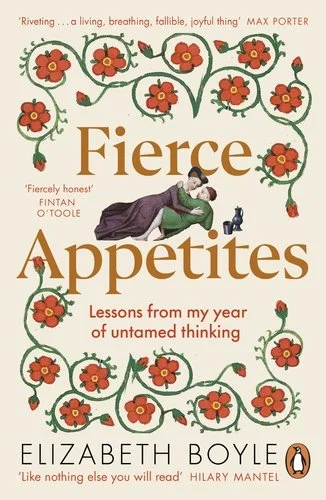Elizabeth Boyle's 'Fierce Appetites'
Various forms of memoir have burgeoned in recent years in Ireland, and many of the best ones have been about women’s experiences: I think of Sinead Gleeson’s Constellations and Emilie Pine’s Notes on Self in particular (best in the non-Irish category: Deborah Levy’s Living Autobiography trilogy).
Now comes another, and in a surprising shape: Elizabeth Boyle’s Fierce Appetites: lessons from my year of untamed thinking combines personal experiences during each month of 2020 with stories from her area of academic expertise, which is early medieval history and literature, especially from Ireland.
She writes that her essays explore three interconnected temporalities: 2020 itself, her own life since she was born in 1980, and the 5th to 12th centuries. The pieces shuttle back and forth between these timezones, moving from literature of which I had almost no knowledge to the many dramas of the current year: the COVID-19 lockdowns, the murder of George Floyd, the US election and more. She mines the early medieval stories in ways that make them seem almost contemporary at times, insights into a world which too often is seen as mystical and unreal.
Into that brew are stirred the fierce appetites of her personal life, about which she is brutally honest (withholding, it seems, in just one area). The first lines startle:
The last words my father said to me were ‘Happy New Year’. By the evening of New Year’s Day he was back in hospital, drowning in his own fluids. The doctors recommended ceasing all treatment and he was moved into a side room to begin dying.
An account of her subsequent lacerating grief follows, joined later by her tumultuous romantic and sexual life, her addictions (especially to alcohol), the troubled history of her relationship with her daughter, her love of heavy metal and much more. It is, as it sounds, a rich mix, but Elizabeth Boyle knows what she is doing throughout, and shapes it all expertly and with control. By the end, she can write:
This year, we have endured. We play games and eat pizza as the year draws to its end. My daughter and I drink champagne and hug each other at midnight.
That is not a pat happy ending, even though the book concludes by echoing the opening: ‘Happy New Year’. It is simply that out of the fierce rawness and unpredictability of life, you grab those moments when you can, and relish them, celebrating your appetites with pizza and champagne.
